Creating a mind-blowing online course is just half the battle. It’s just as important to promote your course effectively; otherwise, no one, not even a search engine, will see it. But where do you start if you have an idea for a course or an already recorded course but nothing else? That’s exactly what we’re going to cover in this post.
The right marketing strategy for selling online courses will help you create suspense, spark enthusiasm, earn quick validation, boost pre-sales, and have all spots booked in no time. If you want to build a business on sharing your expertise, dive in and learn the ropes of promoting educational products.
So, you’ve chosen your online course platform and already created or are in the process of creating your online course. Here is what comes next. Make a solid foundation for your online course marketing strategy by asking yourself the following questions and turning your answers into clear numbers, facts, and statements.
Go over the entire course creation process, from pre-planning to assembling a small team and launching your course.
Who is your ideal student?
First things first — you need to define who exactly you are targeting when promoting online courses. Specify their:
- age group;
- interests and pain points;
- needs and fears;
- favorite platforms and resources;
- role models and influencers;
- typical budget.
Knowing all of that, you can easily pinpoint the platforms you need to focus on, the language you need to be speaking, and the promise you want to be translating. Also, you’ll better understand how to adjust your positioning and pricing strategy to promote your online courses more successfully.
Learn several fundamental steps you need to take to create strong brand positioning.
What will your students achieve after finishing your course?
Whichever medium you use, you always need to focus on the deliverables in your messaging. If anything, you need to promote the results your students will achieve and not the course itself.
New students usually come for the results and stay for the personality of the teacher, not the other way around, unless you are Gordon Ramsay in your niche and your unique personal approach and charisma are very well known. If you want to attract a new audience and make them complete your course, promise them something they’ve always wanted to achieve.
Domestika’s team knows that, and that’s why every single course on their platform promises very tangible, clearly defined results.
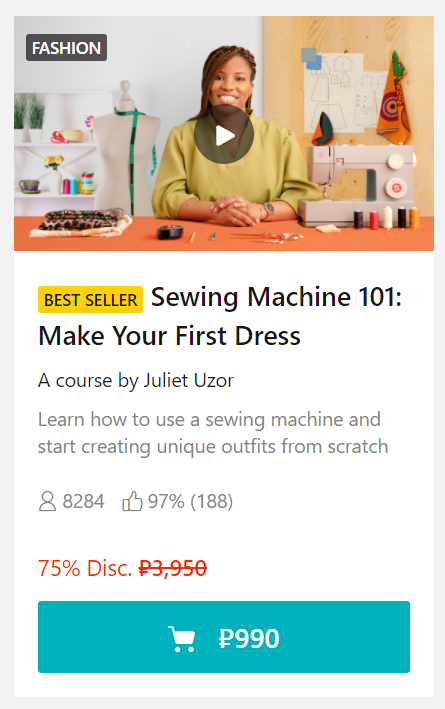 Make a clear promise when presenting and promoting an online course
Make a clear promise when presenting and promoting an online course
Working on your promise will help you understand your own offer better and see it through your students’ eyes. Promoting a vague “Beginner photography course” might be challenging, as opposed to a course named “Go from zero to your first photo project in three weeks.”
How is your course different from other options on the market?
Shaping your unique value proposition is the key to success — the eLearning market is growing rapidly, and consumers can easily get overwhelmed by the variety of choices. The only way to help them find what works best for them is through clear and distinctive messaging.
Specify unique benefits your course provides as GoSkills does — their landing page immediately tells you that their offer has nothing to do with typical generic business courses.
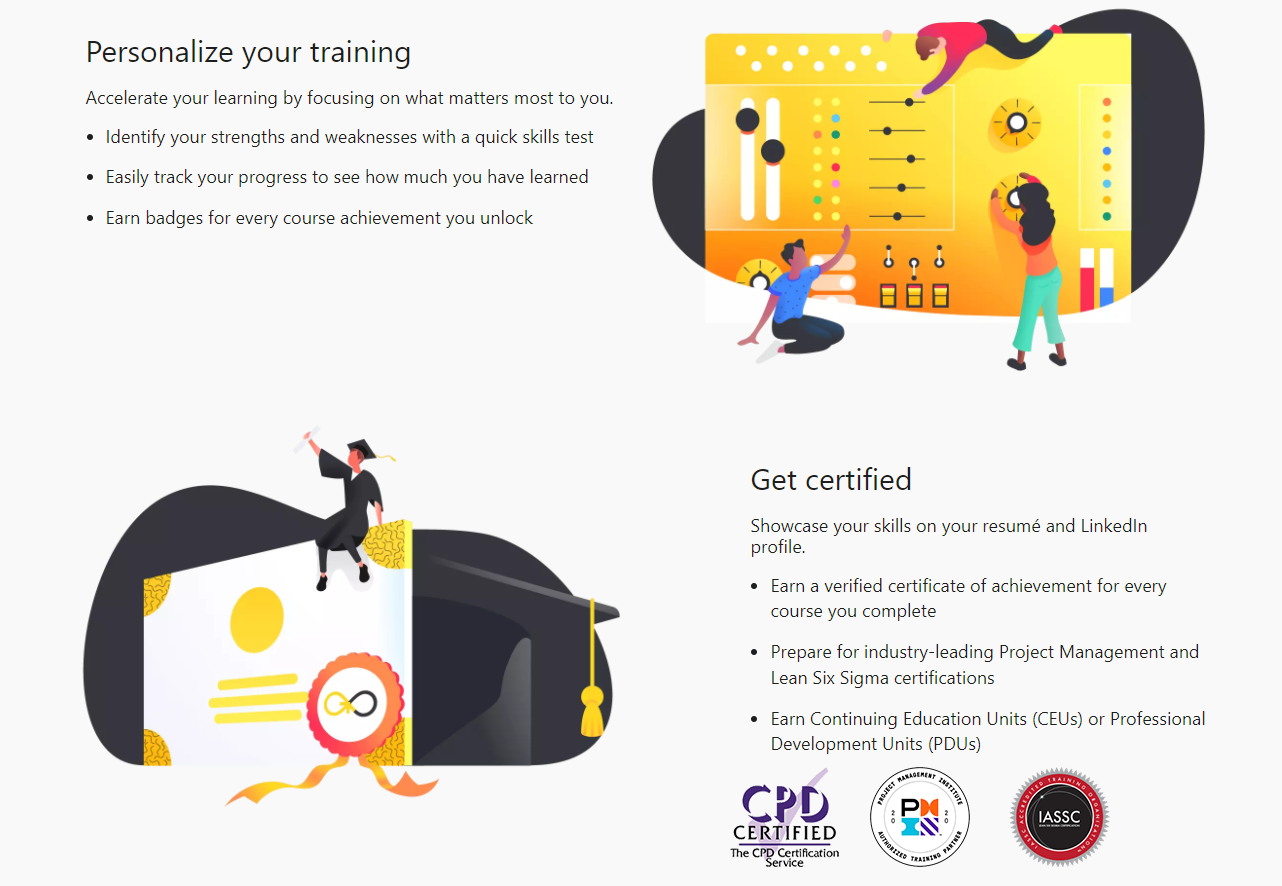 GoSkills points out the important benefits their courses have
GoSkills points out the important benefits their courses have
When you specify right away what makes your courses special and worthwhile, you stand out from the competition and convince your page visitors to give it a try. Do you also give an internationally recognized certificate at the end of your course? Or, maybe, you allow your students to set and reach their own learning goals? Whatever your secret sauce is, make sure to mention it in your marketing messaging.
This one is less exciting but no less important. If your budget is limited, cross out expensive online course promotion options from your list and focus on free channels and practices instead — it’ll bring your eLearning business slow but sustainable growth. On the other hand, if you can afford proper promotion, you should start investing in paid channels right away and build your online reputation in weeks, not months.
In any case, there are some essential tools you may want to include in your budget no matter how big or modest it is:
- online course builder;
- email marketing tool;
- landing page builder;
- webinar platform for live sessions.
You can save money by choosing an all-in-one platform that allows you to create, host, and promote your online courses without having to juggle multiple tools and pay.
How to create a surefire online course marketing strategy
Every successful marketing strategy for selling online courses is unique and niche-dependent, and reasonably so. For instance, it makes sense to promote B2B leadership online courses using Gmail ads and not TikTok. With that in mind, let’s take a look at the fundamental promotion strategy you can apply to any education business and build upon.
Create a landing page for your course
You can’t go any further if your course doesn’t have a dedicated page to send your target audience to. If you plan to sell more courses in the future, think about creating a multi-page website for your online school where each course would have its own landing page.
This clean yet informative landing page from Google Digital Garage can serve as an inspiration:
Create a dedicated landing page for each of your courses
Here’s a checklist of elements every course landing page should contain:
- the relatable language your target audience speaks;
- a clear value proposition promising realistic and measurable results;
- credentials showing what makes you an expert in your niche: your awards, degrees, certificates, and other accomplishments;
- a FAQ section or any other way of addressing common objections and fears;
- testimonials from your students, peers, and opinion leaders;
- landing page images that strengthen your offer;
- a motivating call to action button.
Now, you may have noticed that the example from Google is missing something, namely, testimonials. Why is that so? The only possible explanation is that Google as a brand is strong enough and doesn’t need any additional endorsement. But for small-scale businesses and creators, using social proof is a must.
Discover how to get customer testimonials without being pushy and share them to boost your business’ credibility.
Don’t forget to take care of your landing page’s SEO before and after it goes live:
- Check your page’s loading speed and how its contents are displayed on different devices.
- Write alt text for each of your images and compress them to make your page lighter.
- Set up internal linking if your website has multiple pages.
- Use customized URLs when possible.
- Add meta tags to help search engines index your content and display it in search results.
- Ask Google to recrawl individual URLs or submit a sitemap each time you publish new changes to your website.
You can learn more about on-page optimization from our blog.
Incentivize pre-sales to analyze the existing demand
In addition to your main landing page, you can create a coming-soon page or simply add a countdown timer above the fold every time you launch a new course. Offering early-bird enrollment allows you to test the waters and see how strong is existing demand and how much promotion needs to be done. A countdown creates urgency, motivating users to register for a new course before the deadline.
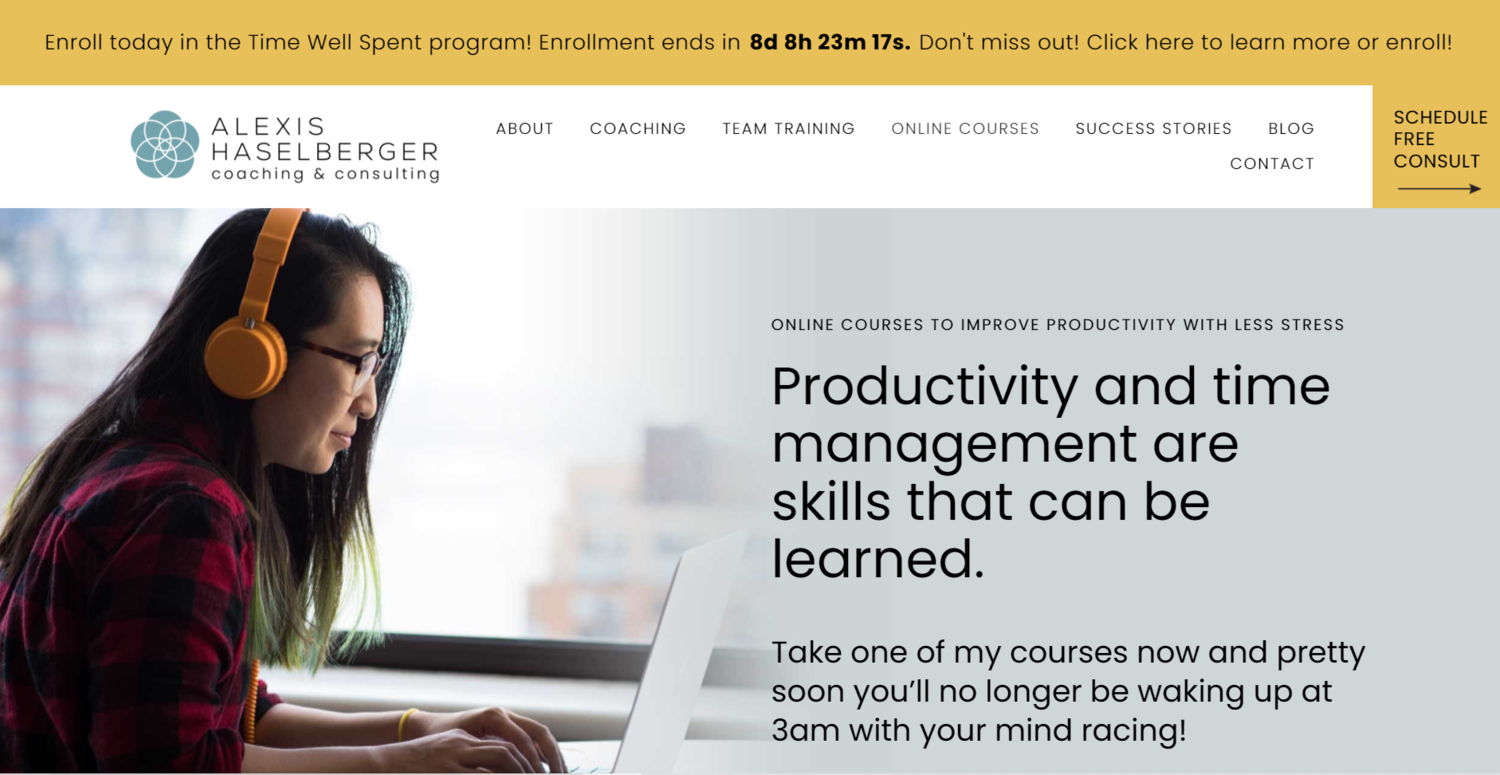 Add a countdown timer to your online course page
Add a countdown timer to your online course page
This website is promoting online courses and coaching services, and it includes a countdown timer, a powerful call to action, and other effective elements we’ve mentioned earlier.
It’s also a great practice to offer a discount for those who sign up early. It’ll speed up the whole decision-making process and allow you to establish contact with your audience long before the beginning of the course. During that time, you can send them nurturing emails to fuel their interest in your educational product even more.
Use lead magnets to grow your mailing list
Try sharing downloadable content to provide value to your potential students and win their attention and contact data. This example is also from the Alexis Haselberger’s website promoting online productivity courses and personal coaching:
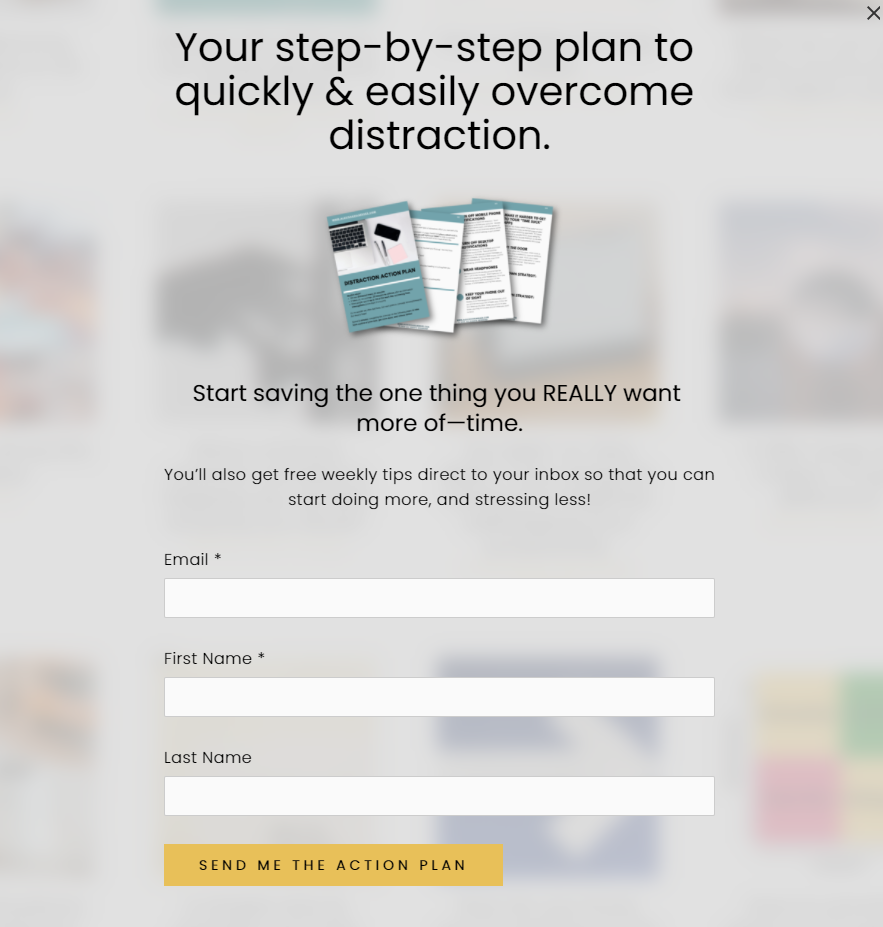 Use lead magnets to share your expertise outside of your courses
Use lead magnets to share your expertise outside of your courses
If you sell educational products, you’re in luck because there’s always something useful to share outside of the curriculum. Don’t ignore lead magnets because they are fantastically effective for building a mailing list. You can share eBooks, checklists, plans, templates, or curated collections with your page visitors and get them hooked on your content.
Send nurturing emails to your students-to-be
Email campaigns are irreplaceable for building and nourishing relationships with customers, and the same holds true for eLearning businesses. Inform your future and existing students about your upcoming courses, send them relevant content, motivate them with inspiring student success stories, and give them sneak peeks of your educational products — with email, your opportunities are endless.
By using email, you cut through the noise and make sure your message gets noticed. The best thing about email is that you can automate your campaigns and focus on content production rather than on repetitive and uninspiring tasks.
Check out a handful of examples to get you inspired and help you kick off your first lead nurturing email campaign.
Run a free webinar to warm up your audience before the launch
A free masterclass, workshop, or Q&A session can be a great way to get to know your audience and boost your credibility by showing them that you are a real person and you do possess the expertise you’re about to share in your paid course.
Back to our favorite example from a productivity coach — she uses free online events to engage with her new subscribers and share helpful techniques.
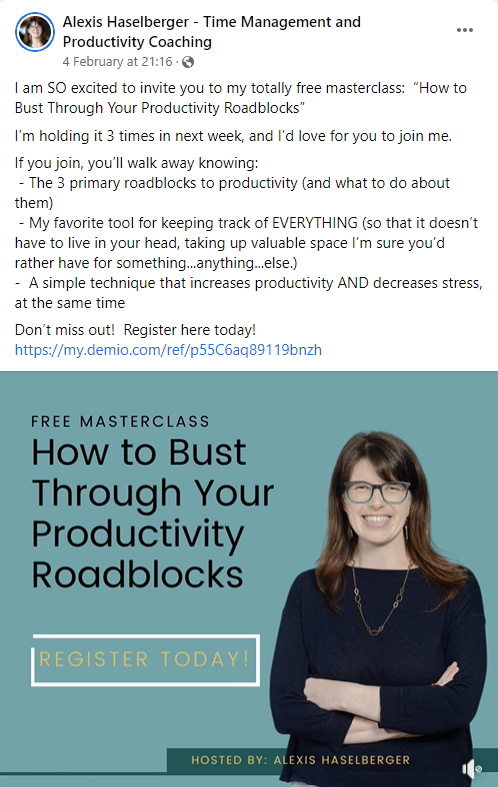 Use online events to turn passive followers into engaged students
Use online events to turn passive followers into engaged students
Live streams and other types of free online events enable you to present your course in real-time and establish an emotional connection with your audience. During your kick-off webinar, you can address their objections and concerns and make them a special offer to reward them for their time and attention. Finish your presentation with an enticing call to action and an attractive offer, and you will likely get first sales within minutes after the webinar.
Keep working on your expert blog
Chances are, you already have a blog but don’t utilize its full potential yet. In fact, an informative blog can help you with both course sales and SEO. Every eLearning business owner has their unique expertise and point of view to share, so don’t shy away from sharing yours.
Here is an example of a small business owner sharing her valuable insights and knowledge about flexibility to attract more dedicated students to her online courses:
 Invest in your blog to promote your online courses organically
Invest in your blog to promote your online courses organically
Custom illustrations, realistic and relatable photos, links to scientific sources — the owner of this online project puts a lot of effort into her blog without having to spend a ton of money on content production. As a result, this blog is the best promotion for her courses since any potential student can clearly see the value this creator provides.
Who doesn’t like to get a great deal if it’s something they’re interested in? Nicely pack your educational products into bundles with more affordable pricing, and you will pique the interest of the most avid learners.
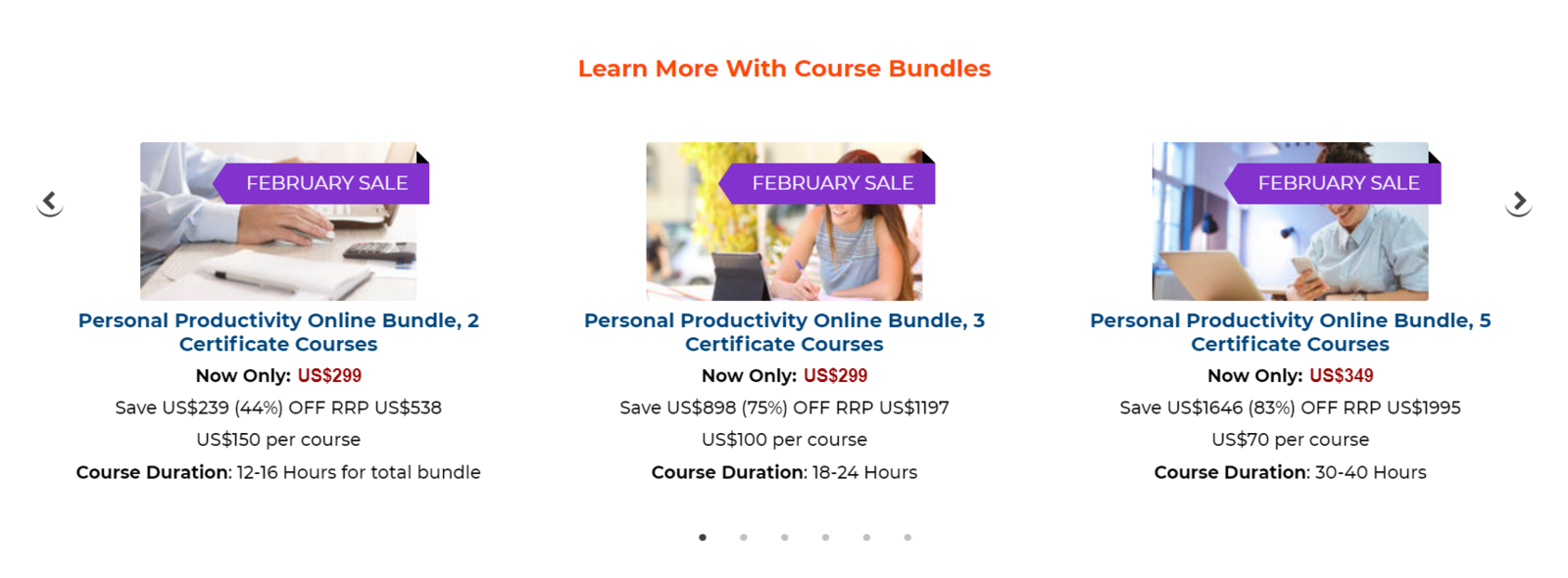 Sell courses in bundles to increase customer value
Sell courses in bundles to increase customer value
You can pair any of your courses, content assets, or other products or services together if they tackle similar topics. For example, you sell a career development course for $350, and your one-on-one career coaching session usually costs $100. You can pack these two offers into an attractive one-time offer priced $400.
Run paid ads on the channel your target audience uses
Paid marketing is the most obvious way to find new students, but it comes with certain risks. If you invest in the wrong channel, you might get additional traffic and nothing more. But you as a course creator don’t need disinterested one-time visitors — you want to get engaged leads who can easily become your dedicated students.
There are three main channels you can rely on regardless of your niche:
For B2B products, ads on LinkedIn will also be helpful. For infotainment and personal services, it makes sense to try TikTok since it’s trendy and the competition there isn’t as steep as on Instagram. Many coaches and entrepreneurs already invest their time and money into TikTok instead of more typical platforms and share bite-sized advice and insights.
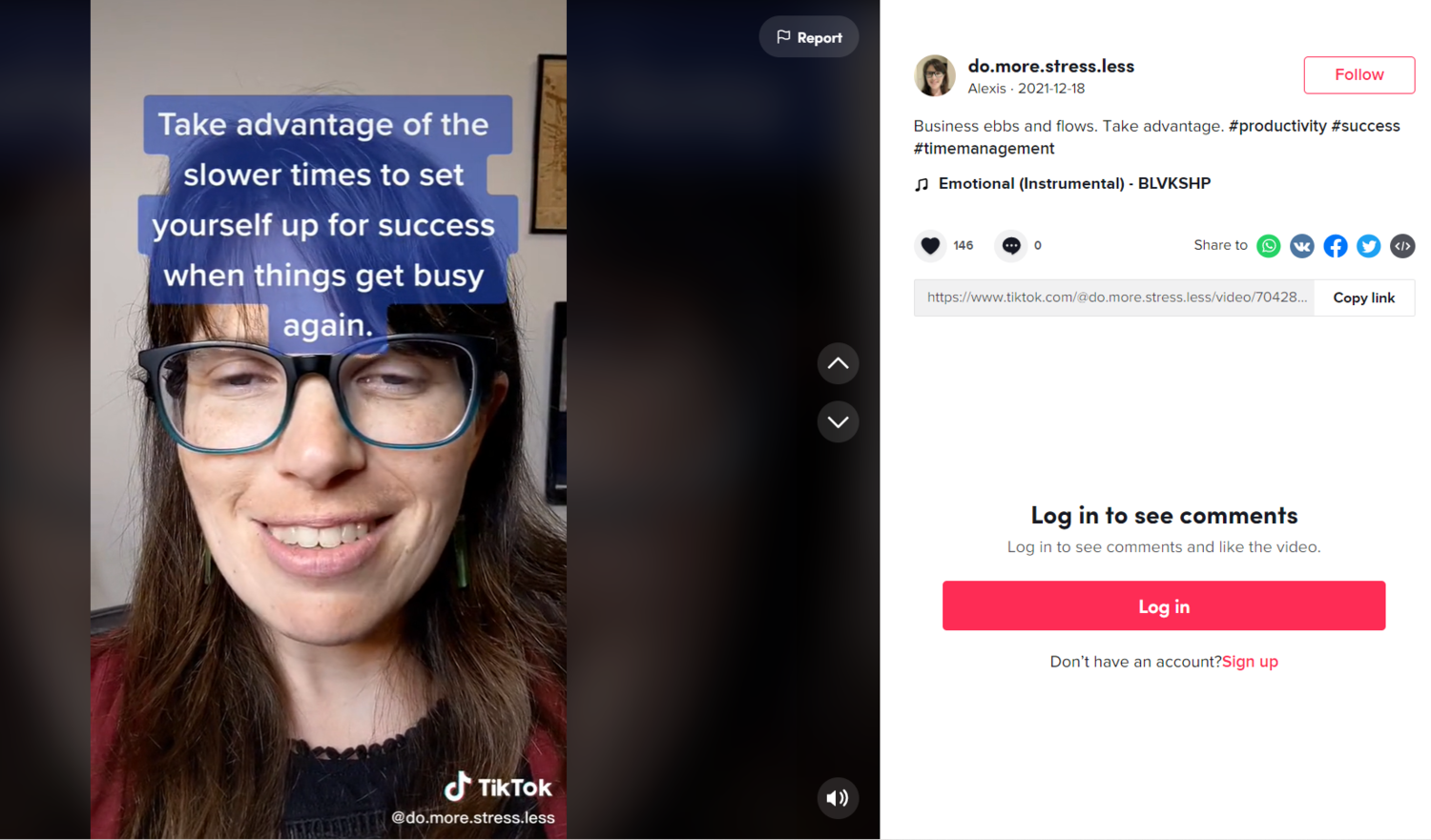 Many businesses and creators start to focus on TikTok instead of Instagram and Facebook
Many businesses and creators start to focus on TikTok instead of Instagram and Facebook
Once you’ve established who represents your core audience, you won’t have any problems choosing the ad format that suits your goals the most.
Ideally, you should plant the seeds of your success early on and launch your courses after establishing some authority in your industry. Sharing valuable content on social media will help you with that — and it shouldn’t be text-heavy content, like in your blog. Instead, opt-in for podcasts, interviews, tutorials, explainers, guides, and other types of visual and audio content your audience can dive into while driving or going for a jog.
Going back to the earlier example of online stretching classes — you’ll find that studio on YouTube as well. They share concise and helpful videos with exercises and full workouts to give their subscribers a preview of what their courses look like, and this strategy works perfectly.
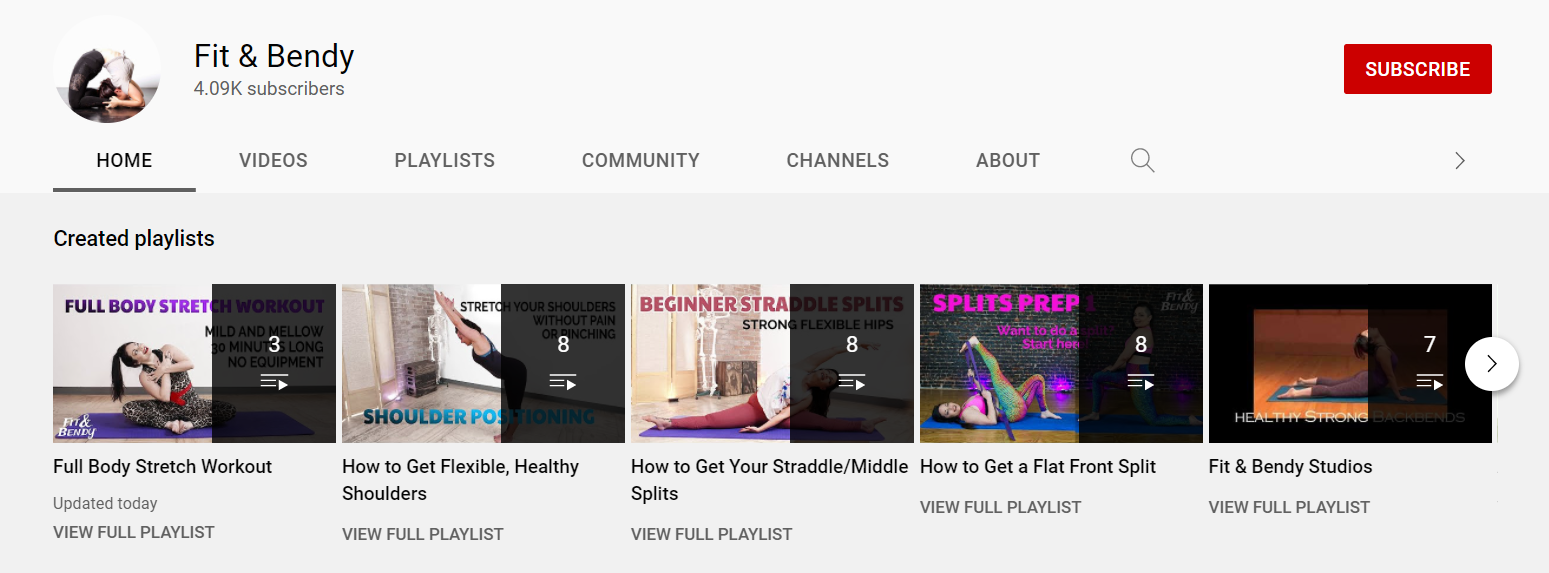 YouTube helps coaches and creators demonstrate their expertise
YouTube helps coaches and creators demonstrate their expertise
Great courses literally sell themselves when you provide your viewers so much value that they just can’t get enough of your content. By giving them digestible tips and tutorials, you also show them how much they can learn from you if they pay for the whole well-structured course. Finally, social media are also great for making announcements, building up suspense, and describing your educational products in great detail.
Collaborate with niche influencers and experts
Conduct research and discover potential partners and thought leaders in your niche you can reach out to. You can offer to speak at someone’s podcast, publish a guest post, or co-promote each other’s content. Either way, you’ll connect with a new audience who has already expressed interest in your topic of expertise.
You can also invite an influencer for an interview or to help you teach a course like The Institute of Makeup Artistry did.
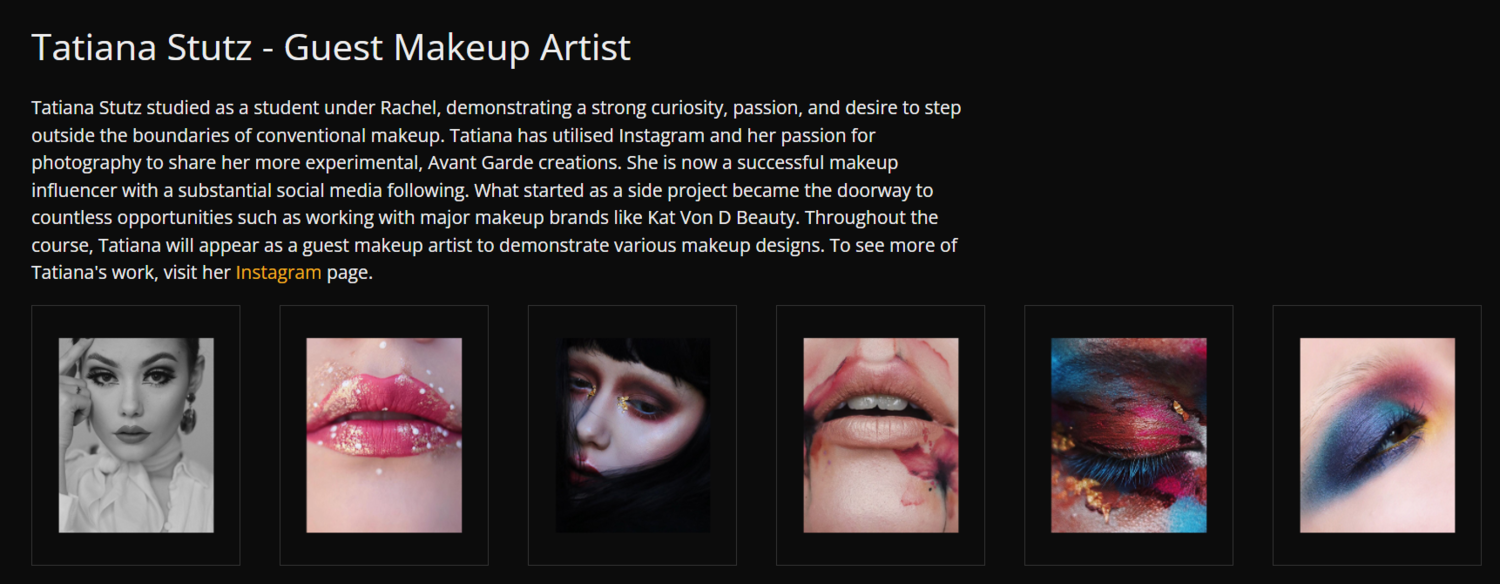 Invite an influencer to attract more attention to your course
Invite an influencer to attract more attention to your course
They’ve invited a popular makeup artist with an impressive following on Instagram to demonstrate her skills on their courses.
 Influencers in your niche can be one of the best ways to promote your course
Influencers in your niche can be one of the best ways to promote your course
You can also ask a niche celebrity for a testimonial and use it as social proof on steroids if, of course, that review is fully authentic and genuine.
Share and celebrate your students’ success
As they say, a teacher’s success begins with the success of their students. This also applies to online course promotion — sharing your students’ achievements will help you attract a new audience and win their trust.
Take one more glance at the productivity course page we’ve shown you earlier:
 Share your student success stories to increase your new audience’s trust
Share your student success stories to increase your new audience’s trust
The coach shares authentic and trustworthy stories her clients send to her regularly, and these stories turn into excellent social proof that helps her sell more educational products. One thing is to read a flashy promotional description, and the other thing is to dive into a real story of someone’s life being drastically improved. You can use social proof not only on your landing page but also on social media and even in your paid ads.
Incentivize referrals and start an affiliate program
Word of mouth can be just as effective as paid channels if you give it an initial kick. Encourage your students to refer to their network, friends, colleagues, or family members in exchange for a nice discount or any other reward. Personal recommendations will boost your brand reputation and give your more loyal students.
An affiliate program can also help you gain a bigger audience. For example, Skillshare partners with like-minded brands and creators to share their new classes. All the other party has to do is add a unique tracking link to their social media or blog post and earn $7 every time someone signs up for Skillshare.
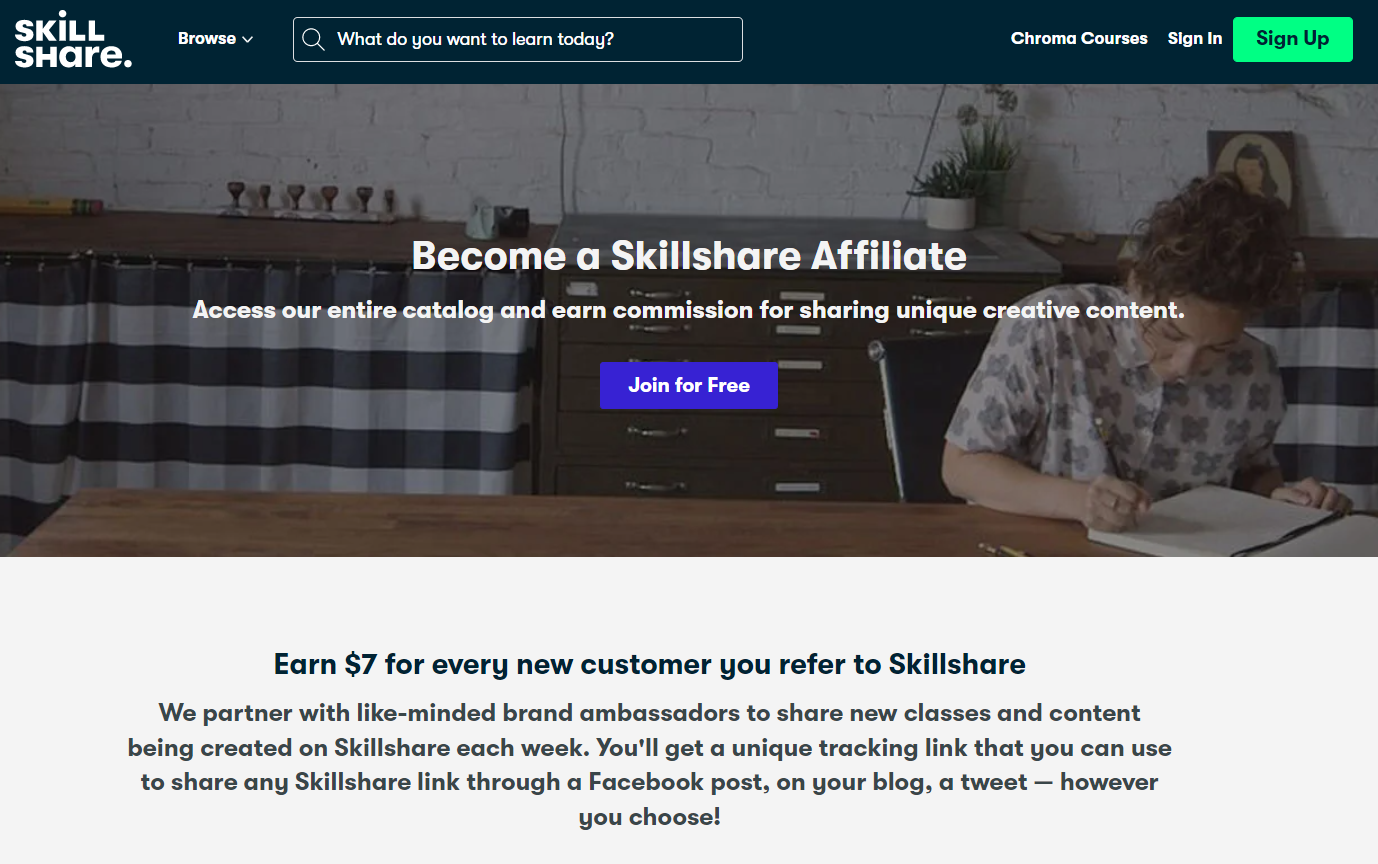 Leverage affiliate marketing to promote your online course
Leverage affiliate marketing to promote your online course
Are you planning on creating your first online course?
We’re launching our online course builder soon and invite you to get early-bird access to this versatile and intuitive tool. You’ll be able to create, manage, promote, and sell your courses easily, thanks to built-in marketing tools such as email automation, CRM, chatbot builder, and more. We have everything you need to start earning money by sharing your knowledge!